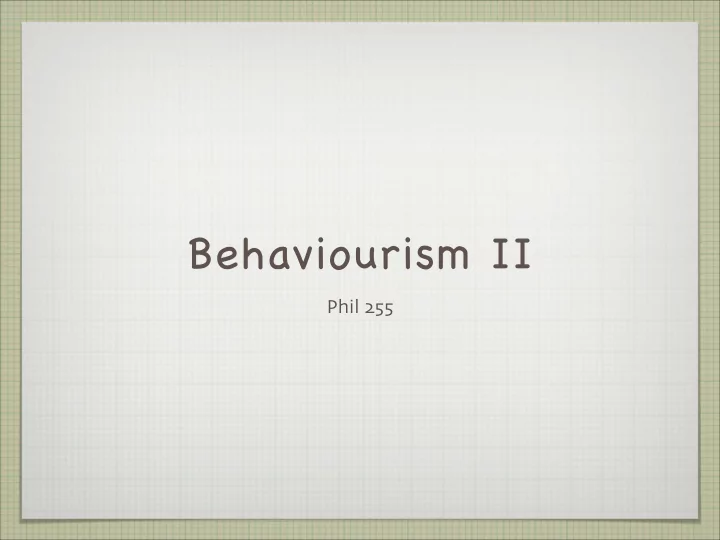

Behaviourism II Phil 255
In Philosophy: Ryle Philosophical views mirrored those of the logical positivists Philosophy should have a clari fi catory role The science of interest to him was psychology Derided Cartesian dualism for positing a “ ghost in the machine ” Accused most psychologists of a serious “ category mistake ” He didn ’ t deny the existence of mind , just thought most psychologists mis - characterized the concept
Criticism of standard usage Begins by sketching opposing view: a “ folk psychological ” description of thinking But thinking is more than just ‘ theoretical deduction ’ : it ’ s everywhere , all the time He notes a “ puzzling element ” in this standard characterization Puzzling because it ’ s unlike all other pursuits ( singing , etc .) We can ’ t answer a variety of straightforward questions about thinking We shouldn ’ t think of thinking as being the moving around of some kind of stu ff Thinking just is a kind of behaviour
Positive View Considers a number of examples of thinking: rowing; admiring roses ( p .99) Ryle points out that there “ incipient thoughts ,” related to the main topics , i . e ., thinking is somehow directed , or dispositional People don ’ t ‘ forget ’ threshold thoughts , they just don ’ t always report them Hence , thoughts are ‘ constitutionally inceptive ’ Can answer the two dominant problems: Chronicling: Mind - stu ff : “ thinking is not a rival occupation to the special occupations ”
Troubles with behaviourism Trouble 1 : Di ff useness Externalism limits available kinds of explanation E . g ., emotion explanations needed to be dispositional Anger , love expressed by any number of behavioural acts Highly contextual , hence in fi nite list Such explanations will require long disjunctive lists of behaviour Circularity: What groups a set of behaviours as related?
Need a ‘ self ’ to evaluate ( or at least a physiological context ) Watson thought that emotion was the sensation of visceral changes removes autonomy physiological changes don ’ t always result in overt behavioural ones are visceral changes variable enough? Maybe have a broader de fi nition of ‘ physiology ’ ? Even less autonomy
Trouble 2: Privacy Explaining the ‘ easy ’ cases for introspectionists: e . g ., Watson ’ s solution: thinking is simply truncated speech ( recall problems ) Skinner ’ s solution: Self - prediction , but we have to be alert , sophisticated detectives doesn ’ t account for a novel plan it doesn ’ t address the problem ( ! )
Ryle ’ s version ( can we use dispositions ) ‘ Le Penseur ’ : he isn ’ t doing anything publically observable and nothing follows what he ’ s doing Ryle ’ s solution ( MM , p . 75) : ‘ as - if ’ mutterings ( that aren ’ t ghostly or symbolic ) sleeping analogy why bother with the pretending when thinking? how do you explain non - moving pretending?
Trouble 3: Productivity Noam Chomsky (‘ the ’ linguist ) : 1956 Review of Skinner ’ s ‘ Verbal Behavior ’ Argued that the productivity of language cannot be explained by behaviourists . Behaviourist explanation of language was essentially statistical Couldn ’ t explain novel grammaticality ambiguity embedded clauses One of the main events in the ‘ cognitive revolution ’ of the 60 s
The legacy Many aspects of behaviorist methodology: scienti fi c , materialist approach behaviour as main measure of mental function Internal processes like ‘ imagery ’ were not taken seriously until the 1970 s . studying ‘ consciousness ’ is only now scienti fi cally respectable New movements in philosophy and psychology , like dynamicism , continue espouse behaviorist methods
Recommend
More recommend